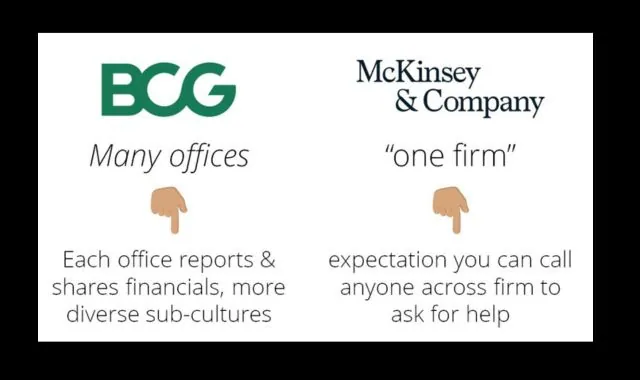Physical Address
304 North Cardinal St.
Dorchester Center, MA 02124
Physical Address
304 North Cardinal St.
Dorchester Center, MA 02124

Choosing a path in consulting is like picking your chariot for a high-stakes race. McKinsey & Company and The Boston Consulting Group (BCG) are titans in the strategy consulting world, boasting impressive track records and attracting the best talent. But with such stellar reputations, a crucial question arises: Is McKinsey truly better than BCG?
The answer, like most things in life, isn’t a simple yes or no. Both firms excel in different areas, and the ideal choice hinges on your individual aspirations and what you seek from your consulting experience. Let’s delve deeper and dissect the key differentiators between these two powerhouses.

Industry Expertise & Focus: McKinsey has traditionally dominated healthcare, government, and public sector consulting. BCG boasts a strong presence in consumer goods and enjoys a growing reputation in technology.
Culture & Work Style: McKinsey leans towards a structured, results-oriented approach. BCG, on the other hand, fosters a more data-driven culture with a strong emphasis on quantitative analysis. This can translate to varying work-life balances, with McKinsey potentially demanding longer hours.
Global Reach & Travel: McKinsey boasts the most extensive global network, offering consultants the chance to work across numerous countries. BCG follows closely behind, while travel opportunities might be slightly less frequent.
Prestige & Brand Recognition: McKinsey holds the crown for brand recognition. It’s often seen as the “golden ticket” to the consulting world. However, BCG’s reputation is rapidly growing, making it a force to be reckoned with.
Alumni Network & Post-Consulting Opportunities: The McKinsey alumni network is vast and influential. Former McKinsey consultants hold leadership positions across industries, opening doors to exciting post-consulting opportunities.
Data-Driven Approach & Analytical Prowess: BCG is renowned for its data-centric approach. They heavily leverage data analytics to solve complex problems and provide clients with fact-based recommendations. This can be a major advantage for companies seeking a quantitative edge.
Client Relationships & Collaborative Culture: BCG fosters a culture of strong client relationships. Consultants work closely with clients, building trust and ensuring solutions are truly aligned with their needs. This collaborative approach can lead to higher client satisfaction and stronger long-term partnerships.
Innovation & Disruption Focus: In today’s rapidly changing landscape, BCG shines in its focus on helping clients navigate disruption. They assist companies in identifying emerging trends, developing innovative strategies, and staying ahead of the curve.
Considering Your Priorities: Choosing between McKinsey and BCG boils down to your priorities. Here’s how to navigate this decision:
Don’t underestimate the power of self-reflection. Are your analytical skills top-notch (BCG) or do you excel at interpersonal connection (BCG might still be a good fit!)? Consider your strengths and weaknesses to see which firm aligns better with your natural talents.
While McKinsey and BCG are undeniably top dogs, the consulting world offers a rich landscape. Don’t forget about:
Ultimately, the choice between McKinsey and BCG is a personal one. By understanding their strengths, weaknesses, and cultural nuances, you can make an informed decision that aligns with your career aspirations. Remember, both firms offer exceptional opportunities for growth, learning, and impact. The real adventure begins when you step into the consulting world, ready to tackle complex challenges and make a difference.
1. Is the work-life balance better at BCG or McKinsey?
There’s no definitive answer. Both firms are demanding, but BCG’s culture might offer slightly more flexibility due to its focus on data analysis, which can be more time-bound.
2. What are the salary differences between McKinsey and BCG?
Salaries are generally comparable at the junior levels, with McKinsey potentially offering a slight edge. However, this can vary depending on location, experience, and performance.
3. How can I improve my chances of getting into McKinsey or BCG?
Focus on developing strong analytical skills, problem-solving abilities, and communication prowess. Network with consultants and alumni, and practice case interview techniques to showcase your strategic thinking.
4. Is an MBA required to work at McKinsey or BCG?
An MBA is not mandatory, but it can be a plus. Exceptional academic performance, relevant work experience, and a strong personal brand can open doors regardless of an MBA.
5. What are some exit opportunities after working at McKinsey or BCG?
The possibilities are vast! Alumni often pursue careers in private equity, venture capital, corporate leadership, or even entrepreneurship. The skills honed at these firms are highly transferable across industries.